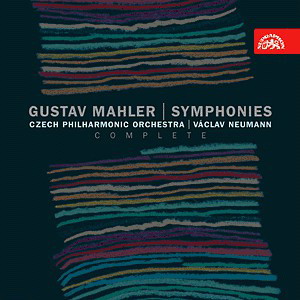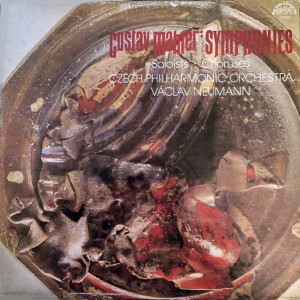 |
|
11
CD's - SU 3880-2 - (c) 2006
|
 |
| 15 LP's
- 1110 4001-15 - (c) 1984 |
|
| GUSTAV
MAHLER (1860-1911) |
|
|
|
|
|
|
|
| Symphony No. 1 in
D major - (1888, rev 1896-98) |
|
51' 03" |
|
| - 1. Langsam.
Schleppend - Wie ein Naturlaut |
12' 57" |
|
CD 1 |
| - 2. Kräftig bewegt,
doch nicht zu schnell |
8' 24" |
|
CD 1 |
| - 3. Feierlich und
gemessen, ohne zu schleppen |
10' 37" |
|
CD 1 |
| -
4. Stürmisch bewegt |
18' 52" |
|
CD 1 |
|
|
|
|
| Symphony
No. 2 in C minor "Resurrection" - (1884-86, rev
1893-96) |
|
75' 36" |
|
| -
1. Adagio maestoso. Mit durchaus
ernstem und feierlichem Ausdruck |
19' 05"
|
|
CD 2 |
-
2. Andante moderato. Sehr
gemächlich. Nicht eilen
|
8' 55"
|
|
CD 2 |
| -
3. In ruhig fliessender
Bewegung |
10' 43"
|
|
CD 2 |
-
4. Urlicht. Sehr
feierlich, aber schlicht (Wds. "Des
Knaben Wunderhorn")
|
5' 17"
|
|
CD 2 |
| -
5. Im Tempo des
Scherzos. Wild herausfahrend (Wds.
Klopstock and Mahler) |
31' 15" |
|
CD 2 |
|
|
|
|
| Symphony
No. 3 in D minor - (1893-96, rev
1906) |
|
91'
11"
|
|
| -
1. Kräftig. Entschieden |
31' 03" |
|
CD 3 |
| -
2. Tempo di menuetto |
8' 43" |
|
CD 3 |
| -
3. Comodo. Scherzando. Ohne Hast |
16' 29" |
|
CD 3 |
| -
4. Sehr Langsam. Misterioso. "O
Mensch! Gib acht" (Wds. Friedrich
Nietzsche) |
9' 53" |
|
CD 4 |
| -
5. Lustig im Tempo und keck im
Ausdruck. "Es sungen drei Engel"
(Wds. from "Des Knaben Wunderhorn") |
4' 36" |
|
CD 4 |
| -
6. LAngsam. Ruhevoll |
20' 02" |
|
CD 4 |
|
|
|
|
| Symphony
No. 4 in G major - (1892, 1899-1900,
rev 1901-10) |
|
55' 52" |
CD 5 |
| -
1. Heiter bedächtig. Nicht eilen |
15' 59" |
|
|
| -
2. In gemächlicher Bewegung. Ohne
Hast |
9' 15" |
|
|
| -
3. Ruhevoll |
20' 56" |
|
|
| -
4. Sehr behaglich (Wds. from "Des
Knaben Wunderhorn") |
9' 24" |
|
|
|
|
|
|
| Symphony
No. 5 in C sharp minor - (1901-02) |
|
69' 54" |
CD 6 |
-
1. Trauermarsch. In gemessenem
Schritt
|
11' 04" |
|
|
| -
2. Stürmisch bewegt. Mit größter
Vehemenz |
13' 39" |
|
|
| -
3. Scherzo. Kräftig, nicht zu
schnell |
18' 35" |
|
|
| -
4. Adagietto: Sehr langsam |
10' 03" |
|
|
| -
5. Rondo-Finale. Allegro |
16' 10" |
|
|
|
|
|
|
| Symphony
No. 6 in A minor - (1904) |
|
79' 00" |
CD 7 |
| -
1. Allegro energico, ma non troppo |
22' 02" |
|
|
| -
2. Scherzo: Wuchtig |
11' 55" |
|
|
| -
3. Andante moderato |
14' 05" |
|
|
| -
4. Finale: Allegro moderato |
30' 30" |
|
|
|
|
|
|
| Symphony
No. 7 in E minor - (1906) |
|
81' 11" |
|
| -
1. Adagio - Allegro risoluto ma non
troppo |
21' 31" |
|
CD 8 |
| -
2. Nachtmusik. Allegro moderato |
14' 16" |
|
CD 8 |
| -
3. Scherzo: Schattenhaft. Fließend,
aber nicht schnell |
10' 11" |
|
CD 8 |
| -
4. Nachtmusik. Andante amoroso |
16' 53" |
|
CD 9 |
| -
5. Rondo-Finale |
18' 01" |
|
CD 9 |
|
|
|
|
| Symphony
No. 8 in E flat major "Symphony of
a Thousand" - (1906) |
|
78' 52" |
|
| - Part I. Hymnus
"Veni creator spiritus". Allegro
impetuoso |
24'
13"
|
|
CD 9 |
| - Part II.
Schlußszene aus "Faust". Poco
adagio (Wds. J. W. Goethe) |
54' 49" |
|
CD 10 |
|
|
|
|
| Symphony
No. 9 in D minor - (1909) |
|
77' 28" |
|
| -
1. Andante comodo |
25' 12" |
|
CD 11 |
| -
2. Im Tempo eines gemächlichen
Ländlers |
15' 06" |
|
CD 11 |
| -
3. Rondo-Burleske: Allegro assai.
Sehr trotzig |
13' 25" |
|
CD 11 |
| -
4. Adagio: Sehr langsam und noch
zurückhaltend |
23' 18" |
|
CD 11 |
|
|
|
|
| Symphony
No. 10 - (1909) |
|
22' 43" |
CD 1 |
| -
1. Adagio |
22' 43" |
|
|
|
|
|
|
| Symphony
No. 2 |
Symphony
No. 3 |
Symphony
No. 4 |
Symphony
No. 8 |
Czech
Philharmonic Orchestra
|
|
|
|
|
Vaclav
NEUMANN
|
Gabriela
Beňačková, soprano (5)
|
Christa
Ludwig, mezzo-soprano
(4,5) |
Magdalena
Hajóssyová, soprano |
Gabriela
Beňačková, soprano
|
|
Eva
Randová, soprano (4,5)
|
Miroslav
Kejmar, flugelhorn |
|
Inge
Nielsen, soprano |
|
| Prague
Philharmonic Choir |
Kühn Children's
Chorus |
|
Daniela
Šounová-Brouková, soprano |
|
| Josef
Veselka, chorus master |
Jiří
Chvála, chorus master |
|
Vĕra
Soukupová, contralto |
|
|
Prague
Philharmonic Choir |
|
Libuše
Márová, contralto |
|
|
Josef Veselka, chorus
master
|
|
Thomas
Moser, tenor |
|
|
|
|
Wolfgang
Schöne, baritone |
|
|
|
|
Richard
Novák, bass |
|
|
|
|
Kühn Children's
Chorus |
|
|
|
|
Jiří
Chvála, chorus master |
|
|
|
|
Prague
Radio Chorus |
|
|
|
|
Milan
Malý, chorus master |
|
|
|
|
Prague
Philharmonic Choir |
|
|
|
|
Josef
Veselka, chorus master |
|
|
|
|
|
Luogo
e data di registrazione |
|
Dvorak
Hall of the Rudolfinum, Prague
(Repubblica Ceca):
- 3-8 ottobre 1979 (Symphony No.
1)
- 11-16 giugno 1980 (Symphony No.
2)
- 16-19 dicembre 1981 (Symphony
No. 3)
- 13-17 ottobre 1980 (Symphony No.
4)
- 31 gennaio - 2, 7, 16 Febbraio
1977 (Symphony No. 5)
- 24-28 aprile 1979 (Symphony No.
6)
- 11 novembre 1977 - 23 gennaio
1978 (Symphony No. 7)
- 10-14 febbraio 1982 (Symphony
No. 8)
- 12-16 gennaio 1982 (Symphony No.
9)
-
27 febbraio 1976 (Symphony No.
10) |
|
|
Registrazione:
live / studio |
|
studio |
|
|
Recording
directors |
|
Milan
Slavický (Nos. 1, 3, 5-9)
Pavel Kühn (No. 2, 10)
Jeroslav Krček (No. 4)
|
|
|
Recording
engineers |
|
Stanislav
Sýkora (Nos. 1, 2-6, 8-9)
Miloslav Kulhan (Nos. 7, 10)
Václav Roubal (No. 7) |
|
|
Prime Edizione
LP |
|
Supraphon
- 1410 2963 - (1 LP) - durata 51'
03" - (p) 1982 - ADD - (No. 1)
Supraphon - 1410 3441-42 - (2
LP's) - durata 38' 43" & 36'
32" - (p) 1982 - ADD - (No. 2)
Supraphon - 1110 3871-72 - (2
LP's) - durata 56' 15" & 34'
31" - (p) 1983 - DDD - (No. 3)
Supraphon - 1110 3188 - (1 LP) -
durata 55' 52" - (p) 1983 - ADD -
(No. 4)
Supraphon - 1410 2511-12 - (2
LP's) - durata 43' 20" & 46'
10" - (p) 1978 - ADD - (Nos. 5
& Lieder)
Supraphon - 1410 3141-42 - (2
LP's) - durata 48' 09" & 53'
16" - (p) 1980 - ADD - (No. 6
& 10)
Supraphon - 1410 2721-22 - (2
LP's) - durata 45' 58" & 45'
05" - (p) 1980 - ADD - (No. 7)
Supraphon - 1110 3881-82 - (2
LP's) - durata 45' 31" & 33'
30" - (p) 1983 - DDD - (No. 8)
Supraphon - 1110 3891-92 - (2
LP's) - durata 40' 17" & 36'
42" - (p) 1983 - DDD - (No. 9)
|
|
|
Edizione CD |
|
Supraphon
- SU 3880-2 - (11 CD's) - (c) 2006
- ADD/DDD |
|
|
Note |
|
- |
|
|
|
|
|
|
In the
spring of 1948 when Vaclav
Neumann (1920-1995)
took the stage with the
Czech Philharmonic for the
first time, his musical
resumé was still quite
short: he was a graduate of
Josef Micka’s violin studio
at Prague Conservatory,
where he had also studied
conducting under Metod
Doležil and Pavel Dĕdeček;
he and his classmates had
founded a string quartet
which was later to become
the famous Smetana Quartet;
he had become a violist in
the Czech Philharmonic. He
had quickly given up a
career as a chamber musician
because the conductor's
baton attracted him more and
more, and when Rafael
Kubelík emigrated after
February of 1948, the
orchestra didn’t have to
look far to find his
successor. Thus it was that
in 1949 Václav Neumann
joined Karel Šejna as
conductor of the Czech
Philharmonic Orchestra, and
by fall of 1950 he had
directed a number of
significant premieres.
Thanks to Kubelík the
orchestra was an
exceptionally flexible
musical ensemble with
excellent individuals in key
positions. In October 1950
Karel Ančerl was named
artistic director of the
Czech Philharmonic and
Neumann went to Karlovy Vary
to gain more experience. He
later became artistic
director of the Brno
Regional Symphony Orchestra
(1954-1956), eventually
leaving to take the post of
principal conductor of the
Prague Symphony Orchestra.
He continued to maintain his
working relationship with
the Czech Philharmonic,
however, appearing at their
concerts as a guest
conductor.
In 1955 he began to work at
the Comic Opera of Berlin,
where he created a number of
unforgettable productions
with director Walter
Felsenstein. It was at this
time that he also received
his first Grand Recording
Prize of the Charles Cros
Academy (Grand Prix du
Disque Académie Charles
Cros) for his recording of
Janáček's opera The
Cunning Little Vixen.
In June 1964 he was named
general artistic director in
Leipzig and boldly made his
mark on the history of the
famous Gewandhausorchestr
and the Leipzig Opera. He
left this prestigious post
as a protest against the
occupation of Czechoslovakia
in August 1968, and when
Karel Ančerl emigrated to
Canada, became the most
qualified successor to the
conductor’s podium of the
Czech Philharmonic. Once
again he stood at the helm
of that orchestra, which by
then had become
world-famous, ranking among
the best ensembles of its
kind. It was the beginning
of an immensely fruitful and
inspiring symbiosis which
came to an end on September
30, 1990 with Neumann's
retirement.
Václav Neumann succeeded in
maintaining the orchestra at
a high standard of
performance throughout the
entire period, achieving
extraordinary success with
the ensemble on concert
tours of Japan and the USA,
as well as in performances
at the leading European
music festivals. His
activities in the recording
studios of the Czechoslovak
music labels Supraphon and
Panton were particularly
noteworthy. His work for
Supraphon includes roughly
four hundred recordings of
the symphonic and operatic
literature (some works in
more than one version) by
Czech and international
composers. Of particular
interest in his discography
are the complete symphonic
works of Antonín Dvořák,
Gustav Mahler and Bohuslav
Martinů, which received many
international awards.
Although Neumann felt that
the center of his musical
work was his devoted service
to Czech music, the scope of
his repertoire was extremely
broad and also included the
works of contemporary
composers.
|
|